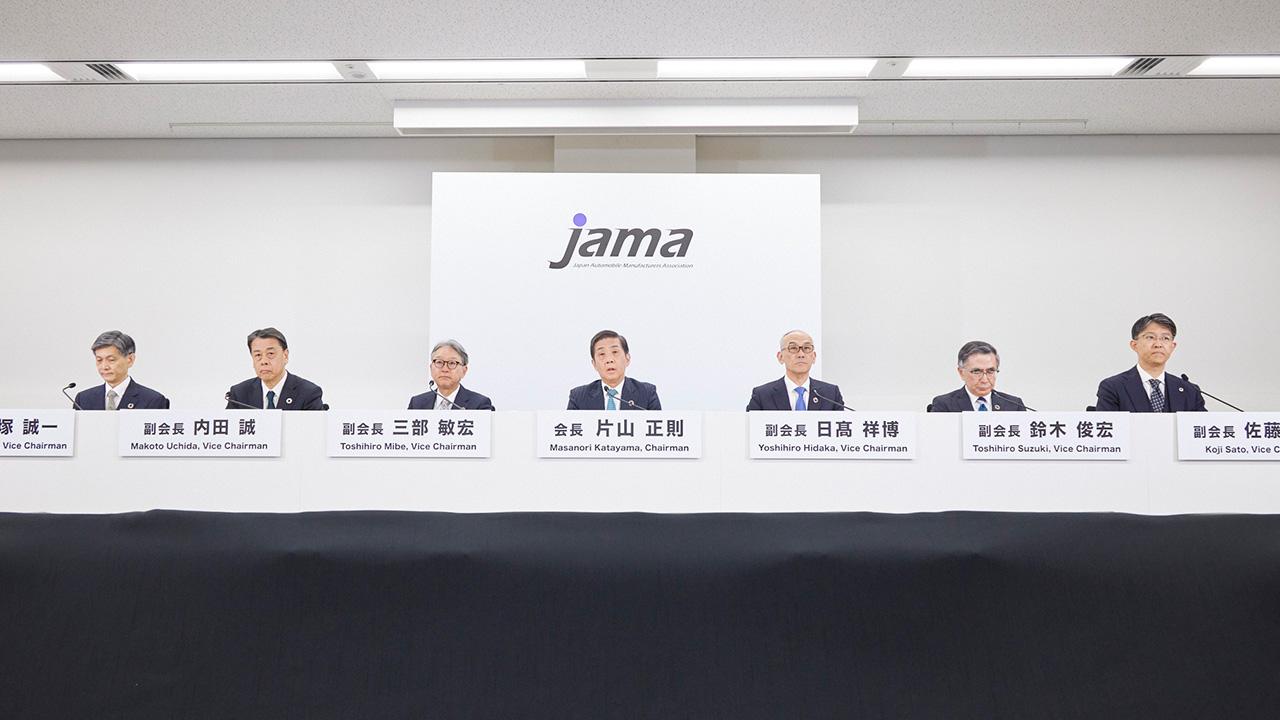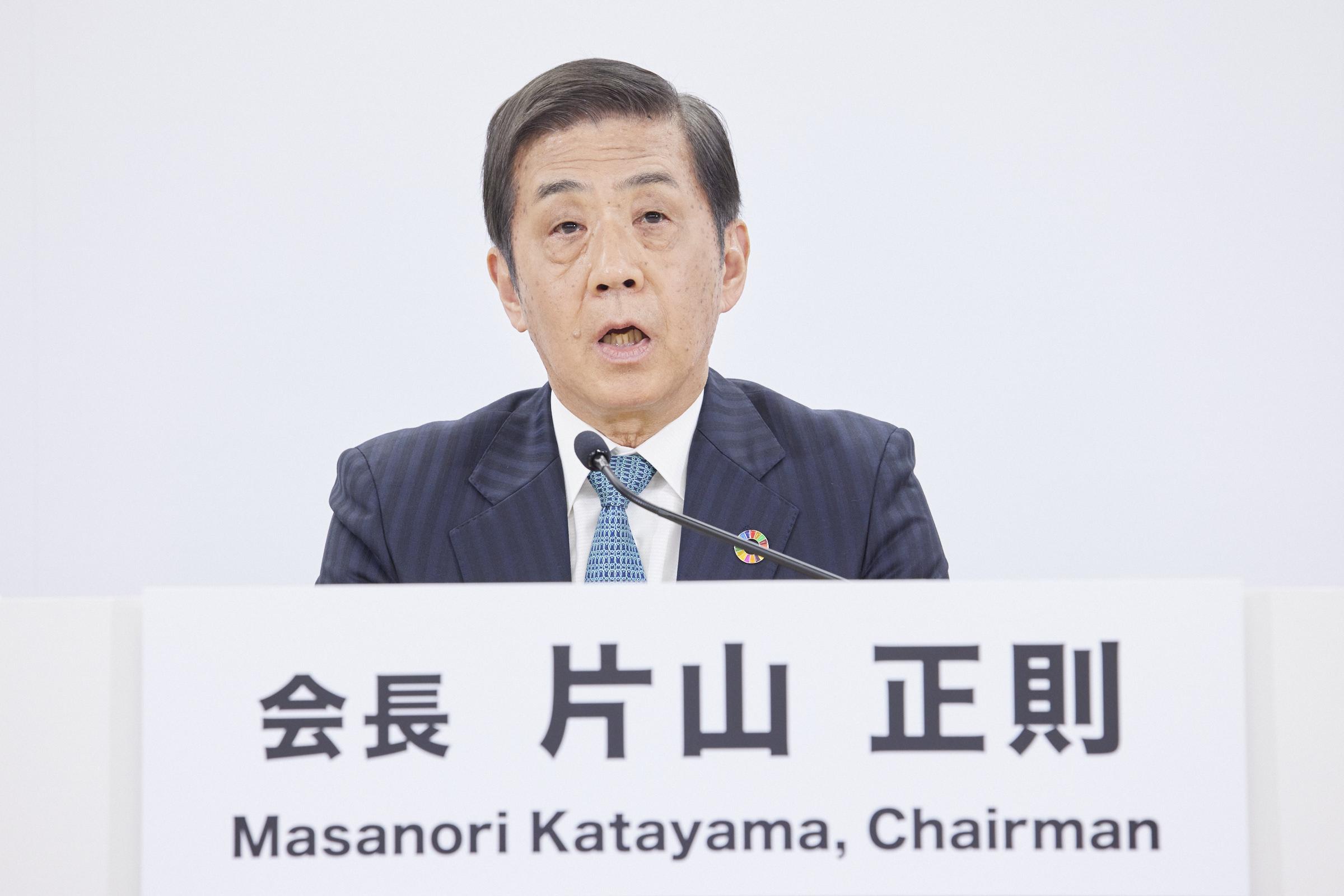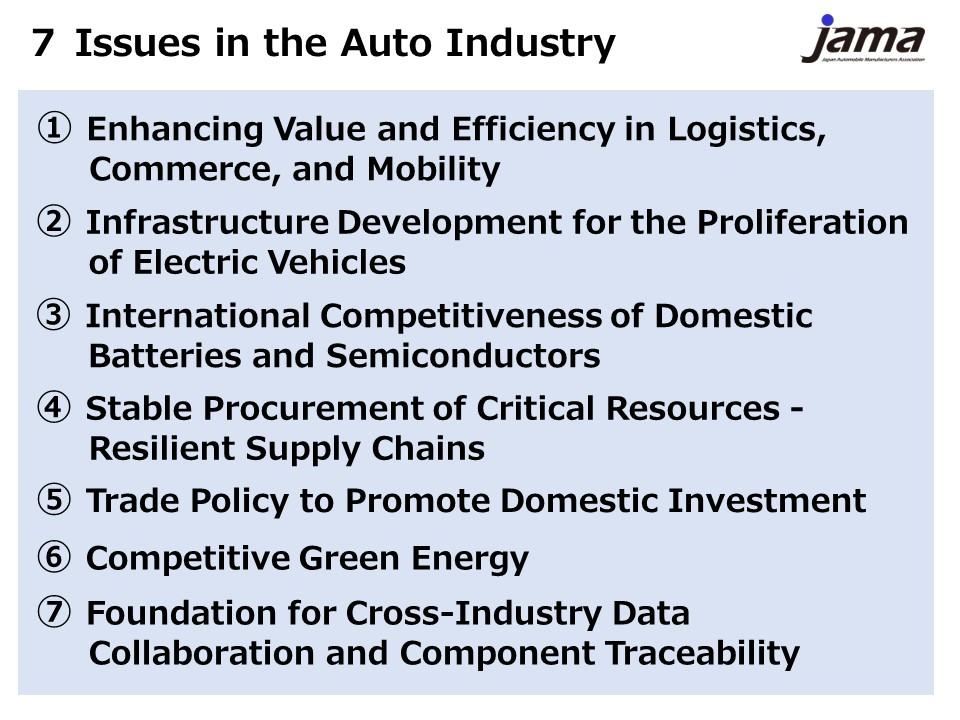
JAMA's chairman and vice chairmen have taken responsibility for tackling seven challenges confronting the auto industry. At a recent press conference, they spoke about their industry-spanning initiatives.

The Japan Automobile Manufacturers Association (JAMA) held a press conference on March 22, 2024.
The organization adopted a new leadership team under Chairman Masanori Katayama (Isuzu), who took over the reins from former Chairman Akio Toyoda (Toyota) in January.
In his first press conference at the helm, Chairman Katayama was joined by JAMA’s six vice chairmen. Together, they explained how the organization is taking ownership of the automotive industry’s seven most pressing issues, including the 2024 logistics problem, as outlined last November.
All-Japan effort gains speed
During his opening remarks, Chairman Katayama described how JAMA’s vice chairmen are leading an all-Japan effort to deal with these challenges by looking beyond the auto industry.
Chairman Katayama

I would like to begin by expressing my deepest condolences for the victims of the Noto Peninsula Earthquake that occurred on January 1 and extending my heartfelt sympathies to all those affected by the disaster.
With many still forced to live in evacuation shelters, we sincerely hope for the speedy recovery of disaster-stricken areas. We will continue to work with national government ministries and local authorities in the affected region to provide assistance in accordance with the needs of communities.
In January, I succeeded Akio Toyoda as JAMA chairman. In this period of once-in-a-century transformation, Japan’s auto industry is facing various challenges, from the pursuit of carbon neutrality to the 2024 problem that threatens to bring logistics to a standstill. Working closely with our vice chairmen and board members, I intend to tackle these issues head-on and commit our full efforts to overcoming this difficult situation.
In addition, following suggestions that a member company violated the Subcontract Act, the Japan Fair Trade Commission has asked us to make examples of infringing conduct widely known to prevent future violations. At the same time, the commission urged further improvements to transactions across the industry, including a revision of how cost reduction requests are made to ensure they comply with laws and regulations related to future price shifts.
At JAMA, we take this matter very seriously. Today, the board agreed that all member companies must take thorough preventative measures, including conducting urgent checks of legal compliance, to further instill proper business practices.
A Fair Trade Commission investigation also named JAMA member companies among businesses found to have left prices unchanged without consulting partners.
Working with the Japan Auto Parts Industries Association, we will ensure that all member companies explicitly consult with partners during price negotiations and adhere to the guidelines for passing on shifting labor costs in pricing.
Regarding the spring wage negotiations, the results have largely been finalized. While protecting jobs through tough economic conditions, the auto industry has sustained wage increases above the average among large manufacturers.
In the most recent negotiations, nearly all member companies fully met worker demands, seeking to raise wages to offset the cost of living. Amid ongoing inflation, JAMA members will continue striving for growth, employment, and the sharing of profits while strengthening business practices to ensure price increases are passed on fairly throughout the supply chain.
JAMA has also identified seven issues that we must focus on over the next two years to develop the auto industry into a mobility industry and keep contributing to the Japanese economy as one of its core sectors.

The first of these—enhancing value and efficiency in logistics, commerce, and mobility—is my personal area of responsibility. I am exploring ways to help solve issues related to the 2024 logistics problem, including through data collaboration and the use of autonomous driving.
I am also addressing the other issues in joint ownership with the vice chairmen here today. We want to coordinate the areas they oversee and speed up an all-Japan effort that extends beyond the auto industry through collaboration with Keidanren’s Committee on Mobility and various companies, as well as discussions with government officials.
The challenges we face are wide-ranging, and we hope that the media will continue to support JAMA's efforts in these areas. Thank you very much.
Next, the vice chairmen outlined their respective challenges and accompanying ambitions. We share each of their comments in these areas.

